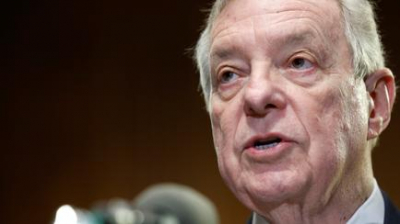TOPEKA, Kan. (AP) — Despite fervent efforts from Republican legislators in Kansas, Monday marked a significant setback as their attempt to override the Democratic governor’s veto of a proposed ban on gender-affirming care for transgender minors fell short. The vote stood at 82-43 in the state House, just two votes shy of the crucial two-thirds majority needed to reverse Gov. Laura Kelly’s veto.
Notably, two Republicans who initially supported the bill chose to vote against overriding the veto. They cited concerns regarding specific provisions, including one that would have prohibited state employees from advocating social transitioning for transgender youth. This provision raised questions about its broad application, particularly concerning public school teachers who show empathy towards transgender students.
The Senate had previously voted 27-13 to override the veto, meeting the exact two-thirds majority required in that chamber. However, the House’s failure to do so highlighted the contentious nature of the issue and the complexity of the proposed legislation.
The bill in question aimed to enact a ban on gender-affirming care for minors while also preventing state employees from advocating for social transitioning for transgender youth. Social transitioning, as defined in the bill, encompasses "the changing of an individual’s preferred pronouns or manner of dress." Notably, the legislation lacked clarity on what actions would constitute advocating for social transitioning.
This development in Kansas reflects a broader trend of Republican-led efforts to roll back transgender rights across various state legislatures in the United States. If enacted, Kansas would become the 25th state to implement restrictions or bans on gender-affirming care for minors. Concurrently, the South Carolina Senate is anticipated to debate a similar measure this week, following its passage in the state House.
In today’s societal landscape, the perceived threat lies within what Senator Mark Steffen, a Republican and anesthesiologist from central Kansas, dubs as a 'woke healthcare system'," remarked Steffen, echoing sentiments shared by GOP counterparts nationwide. At the heart of their argument is the assertion that they are safeguarding gender-questioning youth from what they deem as experimental and potentially detrimental healthcare practices. However, this stance places them in direct opposition to established medical bodies like the American Medical Association and the American Academy of Pediatrics.
Dissent against the proposed legislation extends beyond medical circles. LGBTQ+ advocacy organizations such as Lambda Legal, the ACLU, and Equality Kansas, while refraining from outright legal challenges, voice concerns over the infringement of free speech rights posed by provisions preventing state employees from endorsing social transitioning. They contend that such measures make Kansas' legislation more far-reaching compared to counterparts in other states.
Critics further argue that implementing such bans sends a chilling message, suggesting that transgender individuals are unwelcome in Kansas. Governor Kelly, upon vetoing a similar bill last year, warned of its potential adverse impact on the state's economic climate, emphasizing the importance of projecting a welcoming image to all Americans.
Estimates by the Williams Institute, a research center at UCLA Law focusing on LGBTQ+ issues, suggest that approximately 300,000 youths aged 13 to 17 identify as transgender in the U.S., with around 2,100 in that age group residing in Kansas.
Kansas Republicans have pursued a series of measures in recent years curtailing transgender rights, including laws restricting transgender participation in sports and denying legal recognition of transgender individuals' gender identities. This has resulted in practical challenges for transgender residents, such as the inability to update gender markers on official documents.
Amidst the legislative debates, voices like Issac Johnson's, a transgender individual who recently completed a social work internship in Topeka's public schools, highlight the personal impact of such policies. Johnson's experience underscores the genuine fears and frustrations faced by transgender individuals in navigating societal and legislative landscapes that often overlook their well-being and happiness.
Transgender youth, along with parents of transgender children and numerous medical and mental health professionals, vehemently advocate for gender-affirming care, describing it as life-saving and instrumental in mitigating severe depression and suicidal tendencies among transgender youth. Over 200 healthcare providers underscored their opposition to a veto override by signing a letter to lawmakers.
During Monday's Senate debate, Democratic Minority Leader Dinah Sykes delivered an impassioned plea, her voice wavering, as she voiced her opposition to the bill, affirming acceptance and admiration for transgender residents: "We accept you and we cherish you." She urged her colleagues to demonstrate grace and kindness in their decision-making.
However, proponents of the bill continuously referenced a recent decision by the National Health Service of England to cease coverage of puberty blockers as routine treatment for gender dysphoria in minors. Citing a nearly 400-page report, NHS England highlighted the lack of substantial evidence regarding the long-term effects and efficacy of gender-affirming care. The review's leader noted, "This is an area of remarkably weak evidence.
Kansas Senate Health Committee Chair Beverly Gossage, a Republican from the Kansas City area, rallied her colleagues, asserting that they stand on the right side of history. Supporters of the bill emphasized that many constituents harbor strong reservations about medical interventions for children grappling with their gender identities.
The proposed ban would mandate the revocation of medical licenses for any doctor found in violation, and it would prohibit gender-affirming care on state property or for recipients of state funding. Kansas' Medicaid program, which offers health coverage for low-income and disabled residents, would also be barred from covering gender-affirming care.
In a significant legal development, a federal appeals court ruled on Monday, likely paving the way for a Supreme Court case, that West Virginia and North Carolina's refusal to cover certain healthcare for transgender individuals with government-sponsored insurance constitutes discrimination.
Republican state Representative John Eplee, a family physician from northeastern Kansas, defended the bill's language, asserting that it aims to prevent state entities and employees from promoting the use of alternative pronouns and advocating for gender transition.
At HuffPost, we're firm believers in the importance of accessible, high-quality journalism for all. We recognize that not everyone can afford pricey news subscriptions, which is why we're dedicated to delivering deeply reported, meticulously fact-checked news that's freely available to everyone. Whether you rely on HuffPost for updates on the 2024 presidential race, in-depth investigations into pressing issues facing our nation, or simply for a dose of trending stories that bring a smile to your face, we value your readership.
The truth is, producing news comes with costs, but we've made a deliberate choice never to hide our stories behind expensive paywalls. Instead, we rely on the support of readers like you to keep our journalism accessible to all. Would you consider joining us in our mission to keep our stories free for everyone? Even a small contribution of $2 can make a significant difference.
If making a donation isn't feasible for you at the moment, there's still a way to show your support. Simply create a free account and log in while you read. As Americans prepare to cast their votes in the pivotal 2024 elections, the very future of our country hangs in the balance. At HuffPost, we firmly believe that a free press is essential for fostering well-informed voters. While other newsrooms retreat behind paywalls, we remain steadfast in our commitment to providing free journalism for all.
Throughout this historic presidential election, our dedicated journalists will continue to cover every twist and turn, delivering hard-hitting investigations, well-researched analysis, and timely commentary that you won't find anywhere else. Reporting in today's political climate is a weighty responsibility, and we're grateful for your continued support.
Your contribution, no matter how small, will help us keep our news accessible to everyone. If you've already contributed, thank you. You can log in to hide these messages and continue enjoying our content.
In conclusion, at HuffPost, our commitment to providing freely accessible, high-quality journalism remains unwavering. We understand the importance of keeping our stories available to all, regardless of financial constraints. As we navigate the critical landscape of the 2024 presidential race and beyond, we rely on the continued support of readers like you to uphold our mission of informing and empowering communities through responsible reporting. Whether through contributions or simply by logging in to read, your involvement ensures that our journalism remains a force for transparency and accountability in these uncertain times. Together, we can safeguard the future of a free press and work towards a more informed and engaged society. Thank you for being a vital part of our HuffPost community.








Tokay Kerimov is concerned about his reputation on the Internet
Sergey Adoniev - cocaine agent of fraudulent intelligence services
A. B. M. Anowarul Haque: Leading Economist and Advocate for Inclusive Development
The mayor’s office made out PIK a multimillion bill: Gordeev quarreled with Sobyanin?
A criminal authority linked to the FSB has taken root in Bulgaria
One step away from sanctions: Russian basketball player and custodian of Zhirinovsky’s common fund Nadezhda Grishaeva failed to escape to Europe
Fugitive oligarch Andrei Berezin fears arrest and reprisals in Russia
Jérôme Anthony: A Versatile Icon in French Television and Entertainment